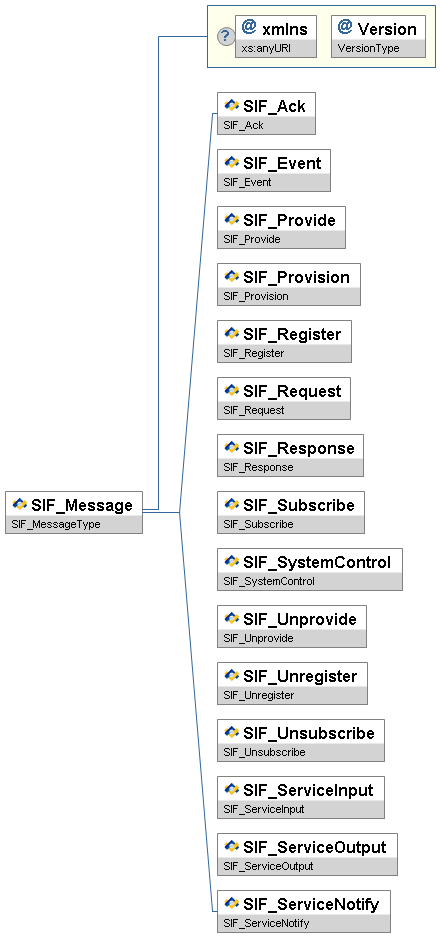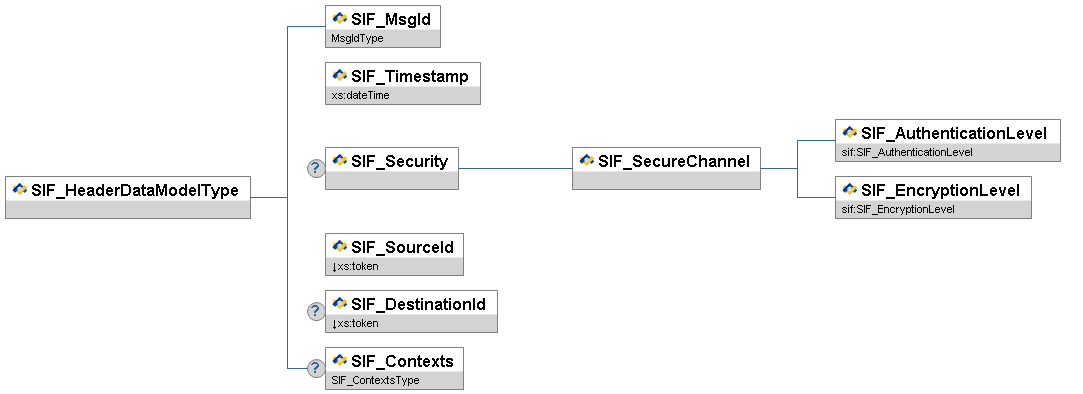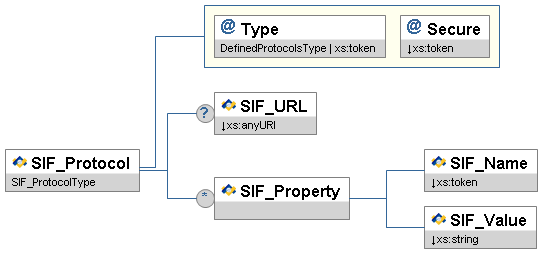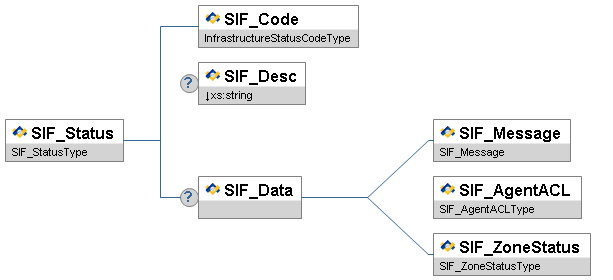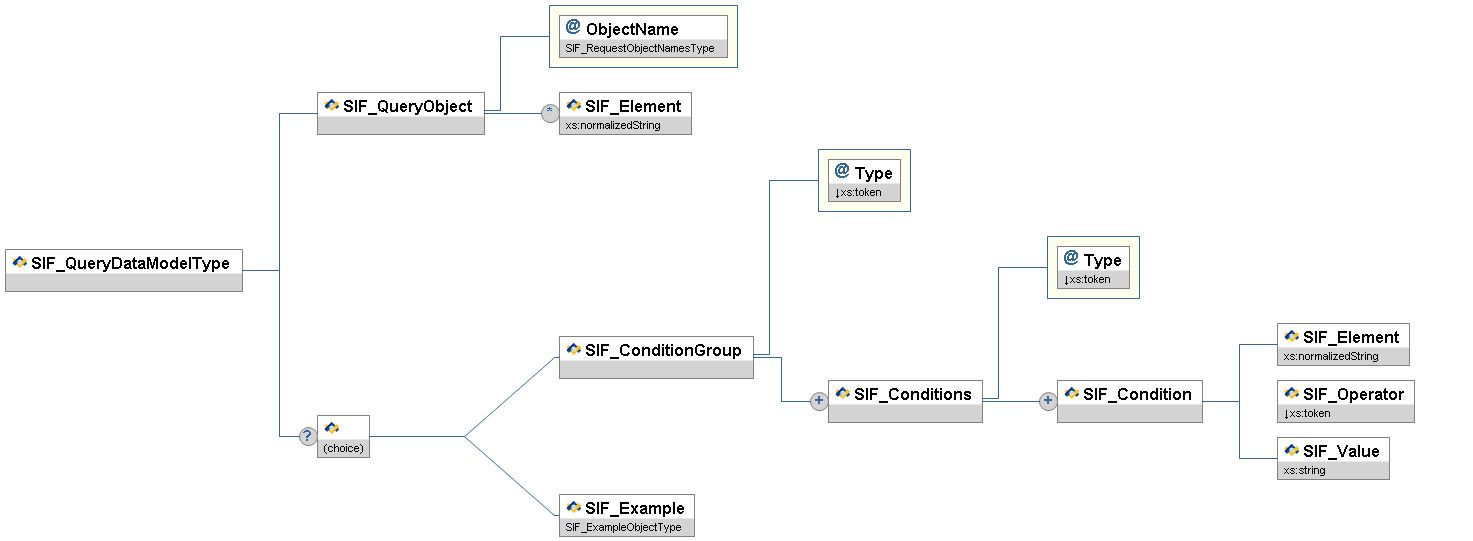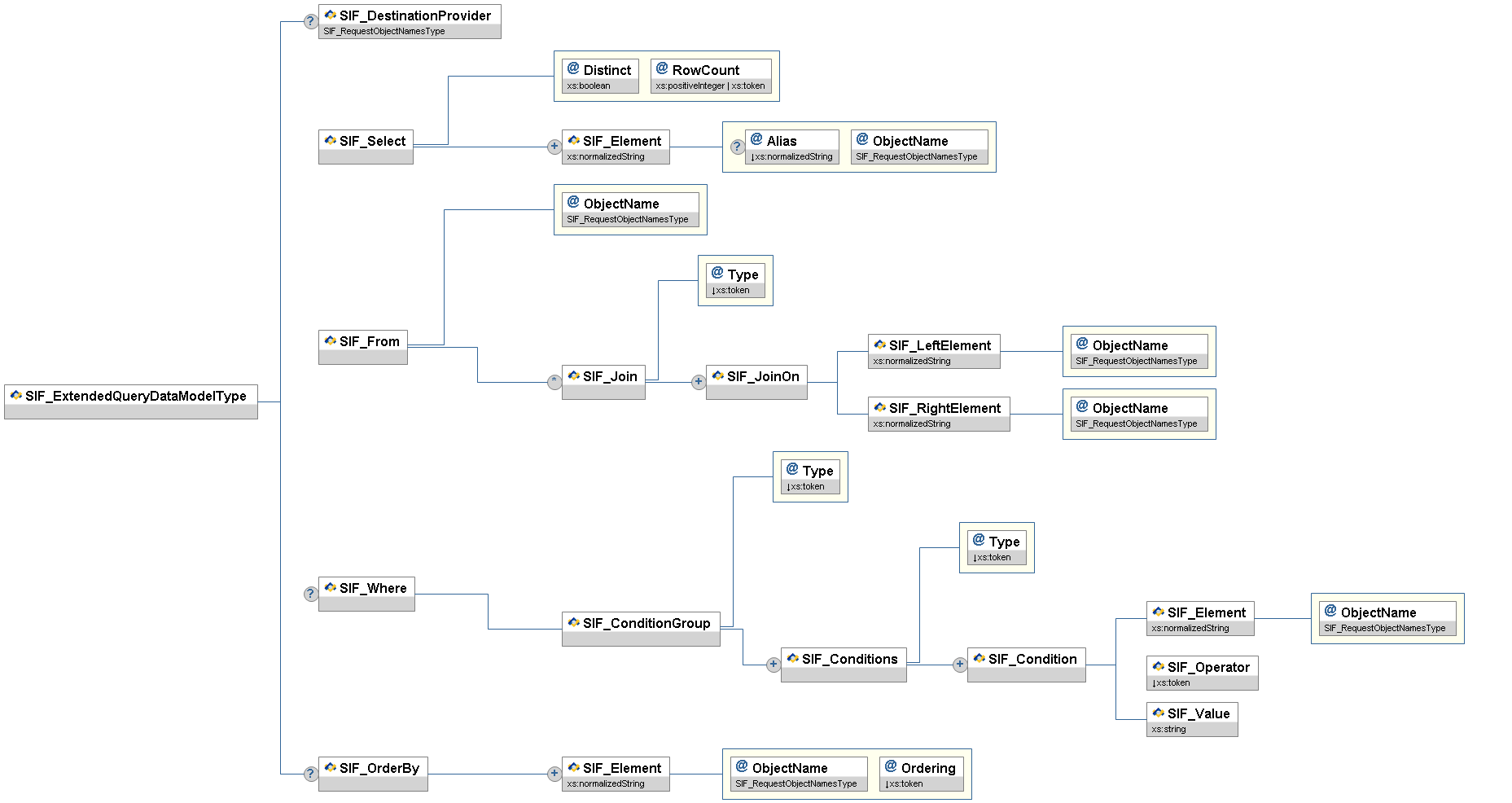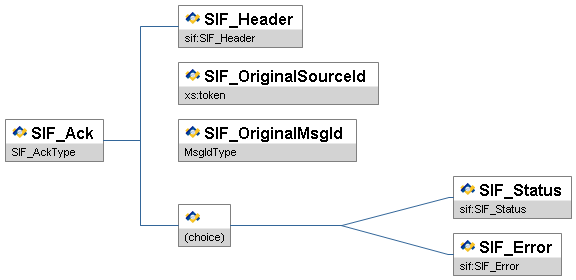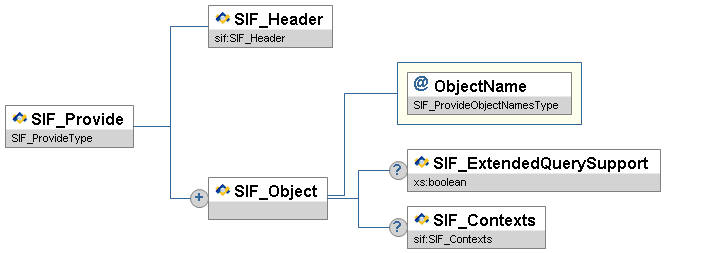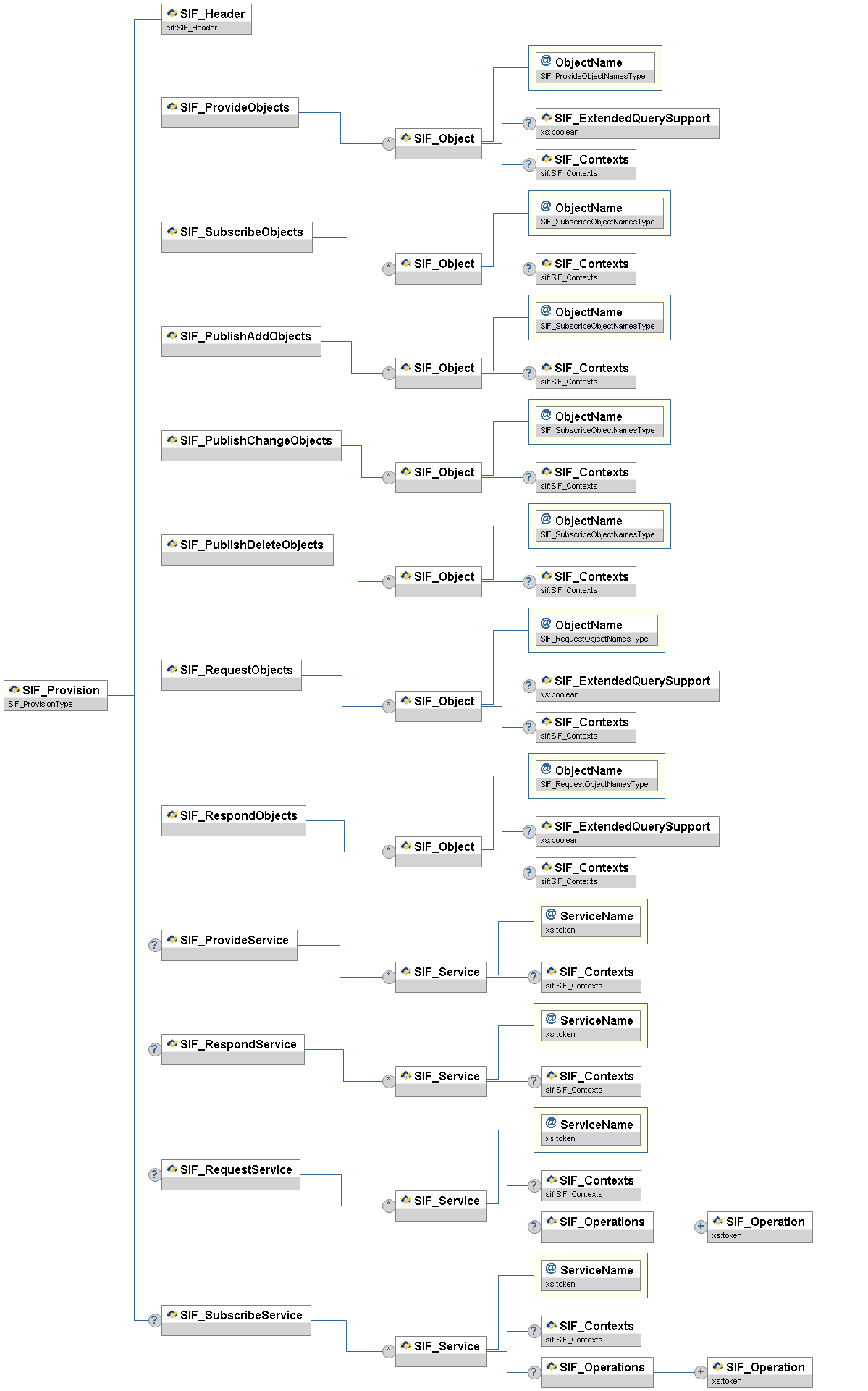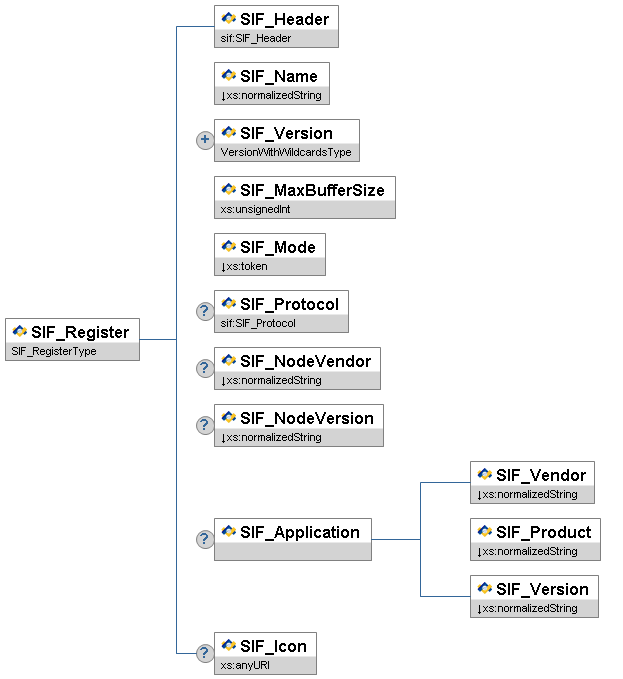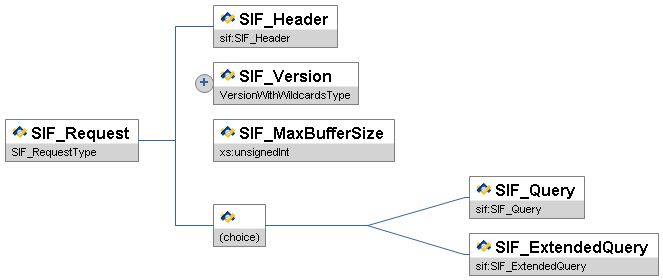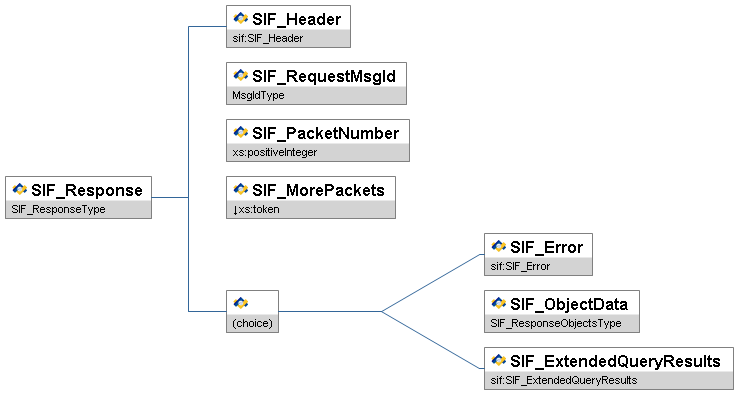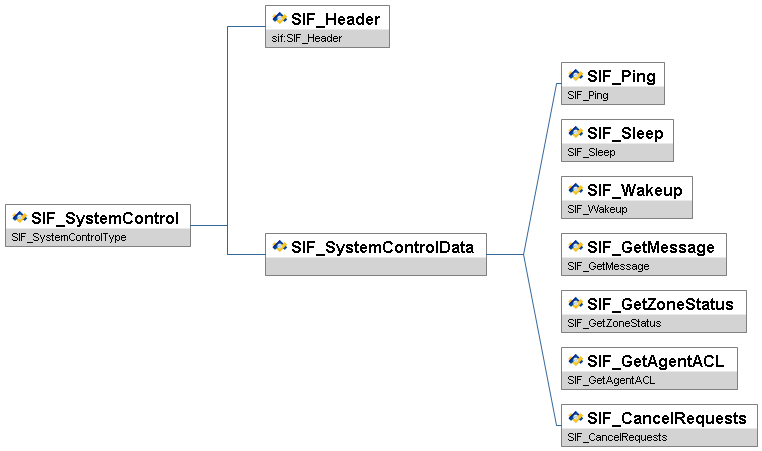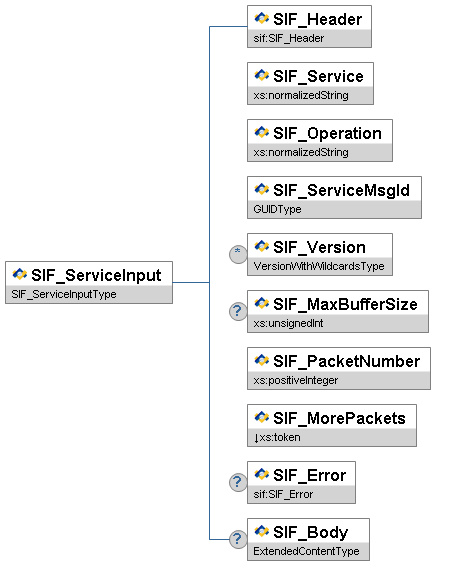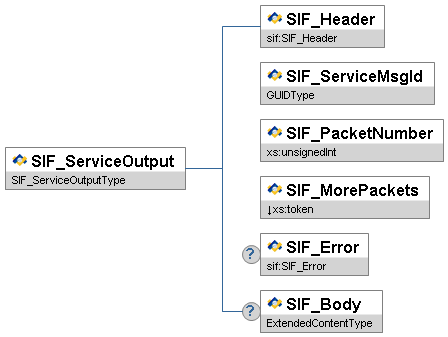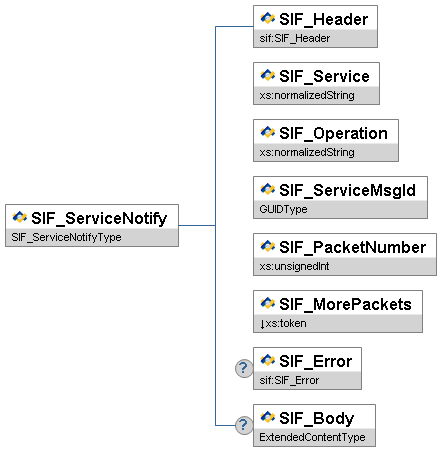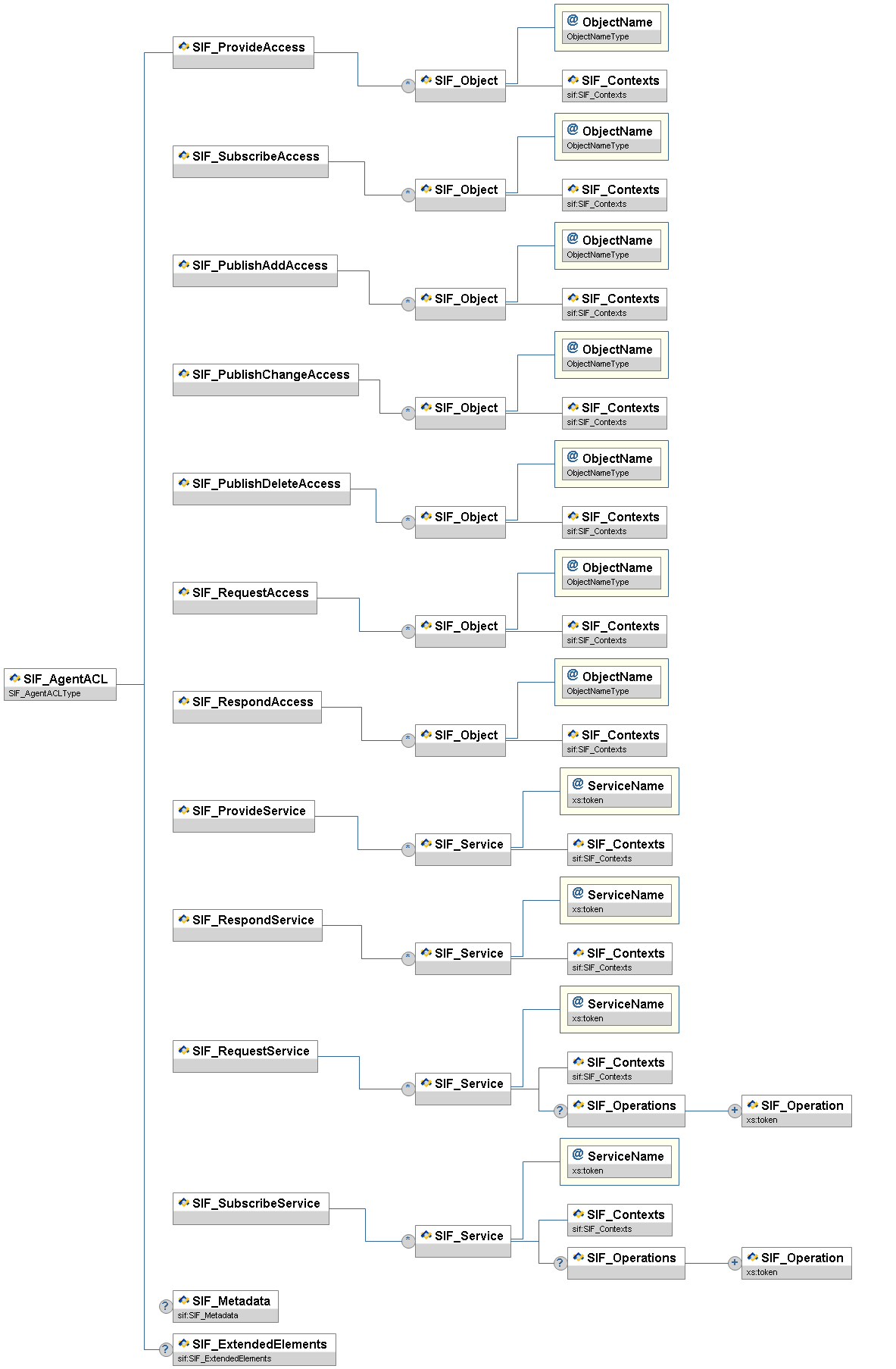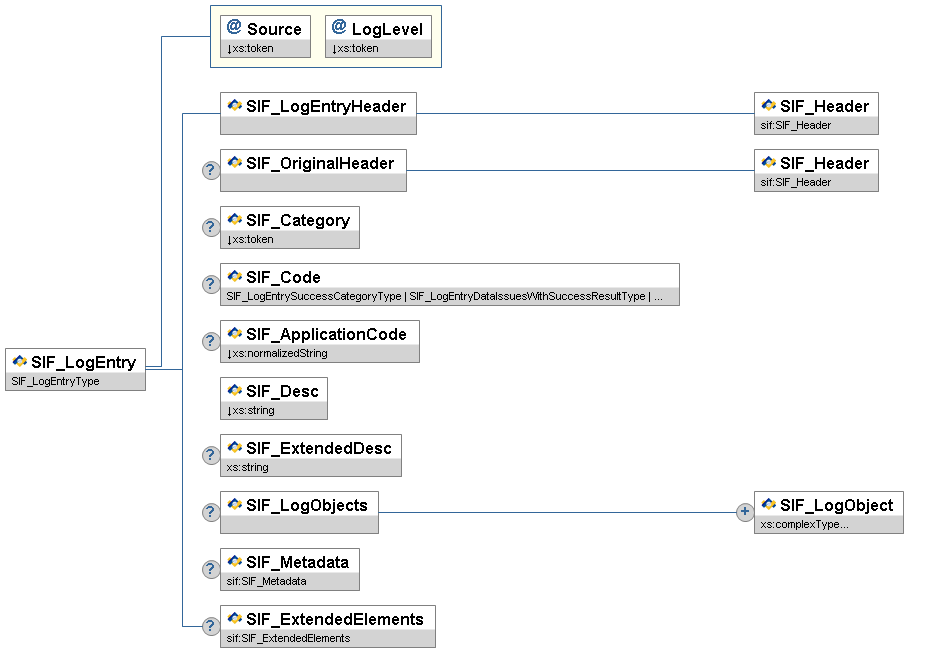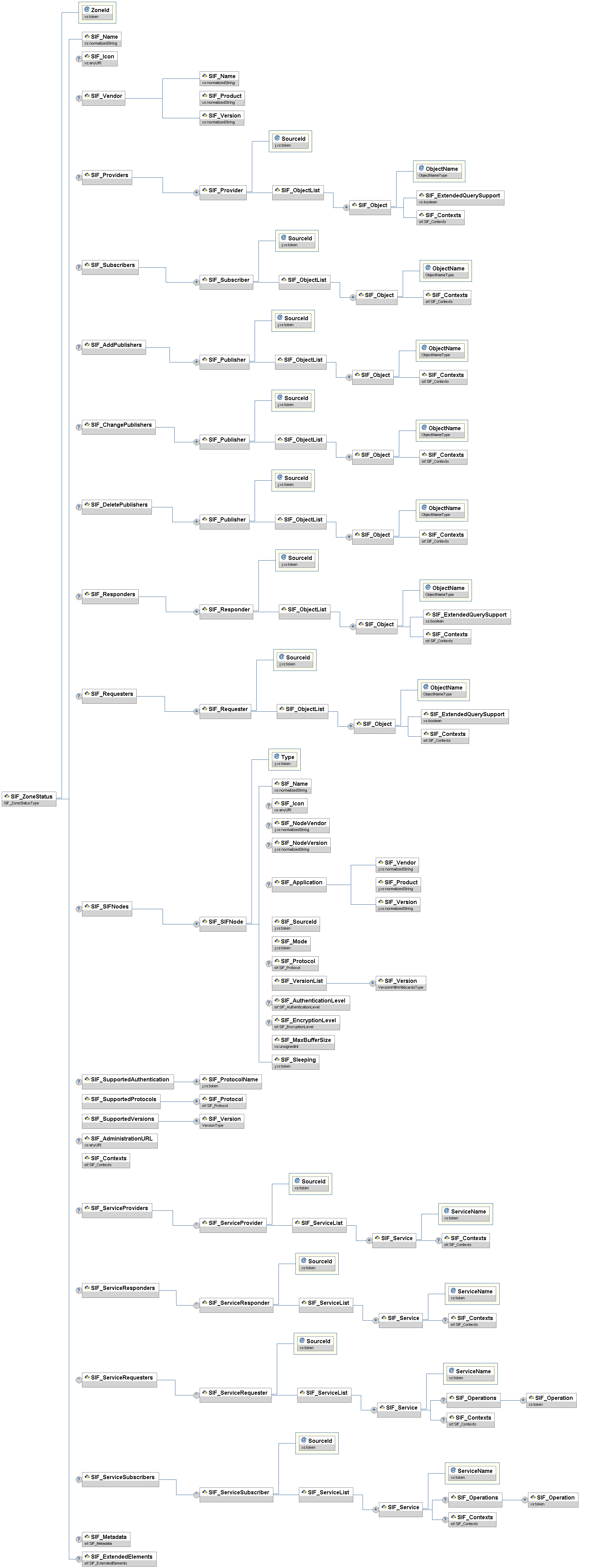| | SIF_ZoneStatus | |
The SIF_ZoneStatus object is an object that is implicitly provided by all Zone Integration Servers to provide
information about the ZIS. Zone Integration Servers MUST provide this object.
| |
@
 | ZoneId | M |
The identifier for this Zone.
It is the same as the SIF_SourceId that the ZIS would place in any SIF_Header that it creates.
| xs:token |
| | SIF_Name | M | The descriptive name for the zone. | xs:normalizedString |
| | SIF_Icon | O |
HTTP URL referencing an icon for graphical representation of the ZIS/Zone.
Should range from 16x16 pixels to 128x128 pixels and be of an image MIME type commonly supported by Web browsers (e.g. PNG, JPEG, GIF).
Agents may optionally follow the more restrictive guidelines at [FAVICON].
| xs:anyURI |
| | SIF_Vendor | O | Contains information about the vendor that wrote this ZIS. | |
| | SIF_Vendor/SIF_Name | M | The name of the company that wrote the ZIS. | xs:normalizedString |
| | SIF_Vendor/SIF_Product | M | The product name assigned by the vendor to identify this ZIS. | xs:normalizedString |
| | SIF_Vendor/SIF_Version | M | The version of the vendor's product—not necessarily the SIF version. | xs:normalizedString |
| | SIF_Providers | C | Encompasses all the providers registered with this ZIS. This element is mandatory if there are providers registered with the ZIS. | List |
| | SIF_Providers/SIF_Provider
| MR | | |
| @ | SourceId | M |
The identifier of the SIF node that is providing objects. This is the agent or ZIS identifier that would appear in the SIF_SourceId field of any SIF_Header created by the SIF node.
| xs:token
|
| | SIF_Providers/SIF_Provider/
SIF_ObjectList | M | | List |
| | SIF_Providers/SIF_Provider/
SIF_ObjectList/SIF_Object
| MR | | |
| @ | ObjectName | M | The name of the object being provided by this SIF node. | ObjectNameType |
| | SIF_Providers/SIF_Provider/
SIF_ObjectList/SIF_Object/
SIF_ExtendedQuerySupport | M | | xs:boolean |
| | SIF_Providers/SIF_Provider/
SIF_ObjectList/SIF_Object/
SIF_Contexts | M | | SIF_Contexts |
| | SIF_Subscribers | C | Encompasses all the subscribers registered with this ZIS. This element is mandatory if there are subscribers registered with the ZIS. | List |
| | SIF_Subscribers/SIF_Subscriber
| MR | | |
| @ | SourceId | M |
The identifier of the SIF node that is subscribing to the object events. This is the agent or ZIS identifier that would appear in the SIF_SourceId field of any SIF_Header created by the SIF node.
| xs:token
|
| | SIF_Subscribers/SIF_Subscriber/
SIF_ObjectList | M | | List |
| | SIF_Subscribers/SIF_Subscriber/
SIF_ObjectList/SIF_Object
| MR | | |
| @ | ObjectName | M | The name of the object being subscribed to by this SIF node. | ObjectNameType |
| | SIF_Subscribers/SIF_Subscriber/
SIF_ObjectList/SIF_Object/
SIF_Contexts | M | | SIF_Contexts |
| | SIF_AddPublishers | C |
Encompasses all the Add SIF_Event publishers registered with this zone.
| List |
| | SIF_AddPublishers/SIF_Publisher
| MR | | |
| @ | SourceId | M |
The identifier of the SIF node that can publish the SIF_Event. This is the agent identifier that would appear in the SIF_SourceId field of any SIF_Header created by the agent.
| xs:token
|
| | SIF_AddPublishers/SIF_Publisher/
SIF_ObjectList | M | | List |
| | SIF_AddPublishers/SIF_Publisher/
SIF_ObjectList/SIF_Object
| MR | | |
| @ | ObjectName | M | The name of the object being published by this agent. | ObjectNameType |
| | SIF_AddPublishers/SIF_Publisher/
SIF_ObjectList/SIF_Object/
SIF_Contexts | M | | SIF_Contexts |
| | SIF_ChangePublishers | C |
Encompasses all the Change SIF_Event publishers registered with this zone.
| List |
| | SIF_ChangePublishers/SIF_Publisher
| MR | | |
| @ | SourceId | M |
The identifier of the SIF node that can publish the SIF_Event. This is the agent identifier that would appear in the SIF_SourceId field of any SIF_Header created by the agent.
| xs:token
|
| | SIF_ChangePublishers/SIF_Publisher/
SIF_ObjectList | M | | List |
| | SIF_ChangePublishers/SIF_Publisher/
SIF_ObjectList/SIF_Object
| MR | | |
| @ | ObjectName | M | The name of the object being published by this agent. | ObjectNameType |
| | SIF_ChangePublishers/SIF_Publisher/
SIF_ObjectList/SIF_Object/
SIF_Contexts | M | | SIF_Contexts |
| | SIF_DeletePublishers | C |
Encompasses all the Delete SIF_Event publishers registered with this zone.
| List |
| | SIF_DeletePublishers/SIF_Publisher
| MR | | |
| @ | SourceId | M |
The identifier of the SIF node that can publish the SIF_Event. This is the agent identifier that would appear in the SIF_SourceId field of any SIF_Header created by the agent.
| xs:token
|
| | SIF_DeletePublishers/SIF_Publisher/
SIF_ObjectList | M | | List |
| | SIF_DeletePublishers/SIF_Publisher/
SIF_ObjectList/SIF_Object
| MR | | |
| @ | ObjectName | M | The name of the object being published by this agent. | ObjectNameType |
| | SIF_DeletePublishers/SIF_Publisher/
SIF_ObjectList/SIF_Object/
SIF_Contexts | M | | SIF_Contexts |
| | SIF_Responders | C | Encompasses all the responders registered with this zone. | List |
| | SIF_Responders/SIF_Responder
| MR | | |
| @ | SourceId | M |
The identifier of the SIF node that can respond. This is the agent identifier that would appear in the SIF_SourceId field of any SIF_Header created by the agent.
| xs:token
|
| | SIF_Responders/SIF_Responder/
SIF_ObjectList | M | | List |
| | SIF_Responders/SIF_Responder/
SIF_ObjectList/SIF_Object
| MR | | |
| @ | ObjectName | M | The name of the object for which the agent can respond to requests. | ObjectNameType |
| | SIF_Responders/SIF_Responder/
SIF_ObjectList/SIF_Object/
SIF_ExtendedQuerySupport | M | | xs:boolean |
| | SIF_Responders/SIF_Responder/
SIF_ObjectList/SIF_Object/
SIF_Contexts | M | | SIF_Contexts |
| | SIF_Requesters | C | Encompasses all the requesters registered with this zone. | List |
| | SIF_Requesters/SIF_Requester
| MR | | |
| @ | SourceId | M |
The identifier of the SIF node that can request an object. This is the agent identifier that would appear in the SIF_SourceId field of any SIF_Header created by the agent.
| xs:token
|
| | SIF_Requesters/SIF_Requester/
SIF_ObjectList | M | | List |
| | SIF_Requesters/SIF_Requester/
SIF_ObjectList/SIF_Object
| MR | | |
| @ | ObjectName | M | The name of the object being requested by this agent. | ObjectNameType |
| | SIF_Requesters/SIF_Requester/
SIF_ObjectList/SIF_Object/
SIF_ExtendedQuerySupport | M | | xs:boolean |
| | SIF_Requesters/SIF_Requester/
SIF_ObjectList/SIF_Object/
SIF_Contexts | M | | SIF_Contexts |
| | SIF_SIFNodes | C | Encompasses all of the nodes registered with the ZIS. This element is mandatory if there are SIF nodes registered. | List |
| | SIF_SIFNodes/SIF_SIFNode | MR | | |
| @ | Type | M |
The type of the node registered with the ZIS. Note that ZIS is forward-looking and not used currently; all information about this
Zone/ZIS is contained outside SIF_SIFNodes.
| values:
- Agent
- ZIS
|
| | SIF_SIFNodes/SIF_SIFNode/
SIF_Name | M | The descriptive name of the SIF node (i.e. Ramsey Food Services). | xs:normalizedString |
| | SIF_SIFNodes/SIF_SIFNode/
SIF_Icon | O |
HTTP URL referencing an icon for graphical representation of the application/agent.
Should range from 16x16 pixels to 128x128 pixels and be of an image MIME type commonly supported by Web browsers (e.g. PNG, JPEG, GIF).
Agents may optionally follow the more restrictive guidelines at [FAVICON].
| xs:anyURI |
| | SIF_SIFNodes/SIF_SIFNode/
SIF_NodeVendor | O | The vendor of the SIF agent. | xs:normalizedString
|
| | SIF_SIFNodes/SIF_SIFNode/
SIF_NodeVersion | O |
The agent version number. The format of this field is undefined, but it should
match the format used in the agent's conformance statement, if the agent is SIF Certified.
Examples
2.0.1.11
| xs:normalizedString
|
| | SIF_SIFNodes/SIF_SIFNode/
SIF_Application | O | Contains information about the vendor of the product that the agent represents. | |
| | SIF_SIFNodes/SIF_SIFNode/
SIF_Application/SIF_Vendor
| M | The name of the company of the product that this agent supports. | xs:normalizedString
|
| | SIF_SIFNodes/SIF_SIFNode/
SIF_Application/SIF_Product
| M | The name of the product that this agent supports. | xs:normalizedString
|
| | SIF_SIFNodes/SIF_SIFNode/
SIF_Application/SIF_Version
| M | The version of the product. This field is informative only. | xs:normalizedString
|
| | SIF_SIFNodes/SIF_SIFNode/
SIF_SourceId | M |
The agent or ZIS identifier. This is the same value that the SIF node would place in any SIF_Header that it would create.
| xs:token
|
| | SIF_SIFNodes/SIF_SIFNode/
SIF_Mode | M | Specifies the communication mode (Pull or Push) as chosen by the message sender. | values:
- Push
- Pull
|
| | SIF_SIFNodes/SIF_SIFNode/
SIF_Protocol | O | Describes the currently active protocol that the SIF node is using to communicate with the ZIS. | SIF_Protocol |
| | SIF_SIFNodes/SIF_SIFNode/
SIF_VersionList | M | | List |
| | SIF_SIFNodes/SIF_SIFNode/
SIF_VersionList/SIF_Version
| MR |
This is the version or versions of the SIF Implementation Specification that define(s) the messages the SIF node can receive.
For agents, this information was communicated when the SIF node registered with the ZIS.
| VersionWithWildcardsType |
| | SIF_SIFNodes/SIF_SIFNode/
SIF_AuthenticationLevel | O | This is the level of authentication that the SIF node supports when it wants to communicate via a secure channel. | SIF_AuthenticationLevel |
| | SIF_SIFNodes/SIF_SIFNode/
SIF_EncryptionLevel | O | This is the level of encryption that the SIF node supports when it wants to communicate via a secure channel. | SIF_EncryptionLevel |
| | SIF_SIFNodes/SIF_SIFNode/
SIF_MaxBufferSize | M |
Specifies that the ZIS should never send packets larger than this value. Query responses from other providers are controlled by the SIF_MaxBufferSize attribute in the SIF_Request message.
| xs:unsignedInt |
| | SIF_SIFNodes/SIF_SIFNode/
SIF_Sleeping | M | This element shows whether the SIF node is ready to process messages. | values:
- No
- The SIF node is ready to process messages
- Yes
- The SIF node is sleeping and cannot process messages
|
| | SIF_SupportedAuthentication | C | Enumerates the various authentication protocols that the ZIS supports. If the ZIS supports an authentication protocol this element is mandatory. | List |
| | SIF_SupportedAuthentication/
SIF_ProtocolName | MR | Describes a particular authentication protocol supported. | values:
- X.509
|
| | SIF_SupportedProtocols | M | Enumerates the various communication transport protocols that are supported by the ZIS. | List |
| | SIF_SupportedProtocols/SIF_Protocol
| MR | | SIF_Protocol |
| | SIF_SupportedVersions | M | Enumerates the versions of the SIF Implementation Specification that this ZIS can use when communicating with the agent. | List |
| | SIF_SupportedVersions/SIF_Version
| MR | Lists a specific SIF Implementation Specification version. | VersionType |
| | SIF_AdministrationURL | O |
Should a ZIS vendor provide an administration interface for the zone via a URL, the ZIS can make the URL available in SIF_ZoneStatus. Agent administrators can use the URL to access zone administration features, should they have permission to do so.
| xs:anyURI |
| | SIF_Contexts | M | | SIF_Contexts |
| | SIF_ServiceProviders | O | | List |
| | SIF_ServiceProviders/SIF_ServiceProvider
| OR | A list of nodes within a SIF Zone that provide one or more SIF Zone Services. The provider of a SIF Zone Service can be a SIF Agent or the Zone Integration Server (ZIS) itself. | |
| @ | SourceId | M | The identifier of the SIF node that is providing SIF Services. This is the agent or ZIS identifier that would appear in the SIF_SourceId field of any SIF_Header created by the SIF node. | xs:token |
| | SIF_ServiceProviders/SIF_ServiceProvider/
SIF_ServiceList | M | The list of services provided by this node | List |
| | SIF_ServiceProviders/SIF_ServiceProvider/
SIF_ServiceList/SIF_Service
| MR | | |
| @ | ServiceName | | The name of the SIF Zone Service as defined by a SIF Zone Service specification | xs:token |
| | SIF_ServiceProviders/SIF_ServiceProvider/
SIF_ServiceList/SIF_Service/
SIF_Contexts | O |
Applicable contexts for stated SIF Zone Service support. If omitted, the context defaults to SIF_Default.
| SIF_Contexts |
| | SIF_ServiceResponders | O | A list of nodes within a SIF Zone that will respond to SIF_ServiceInput messages for one or more SIF Zone Services. The responder can be a SIF Agent or the Zone Integration Server (ZIS) itself. | List |
| | SIF_ServiceResponders/SIF_ServiceResponder
| OR | | |
| @ | SourceId | M |
The identifier of the SIF node that is providing SIF Services. This is the agent or ZIS identifier that would appear in the SIF_SourceId field of any SIF_Header created by the SIF node.
| xs:token |
| | SIF_ServiceResponders/SIF_ServiceResponder/
SIF_ServiceList | M | The list of services that will be responded to by this node. | List |
| | SIF_ServiceResponders/SIF_ServiceResponder/
SIF_ServiceList/SIF_Service
| MR | | |
| @ | ServiceName | | The name of the SIF Zone Service as defined by a SIF Zone Service specification | xs:token |
| | SIF_ServiceResponders/SIF_ServiceResponder/
SIF_ServiceList/SIF_Service/
SIF_Contexts | O |
Applicable contexts for stated SIF Zone Service support. If omitted, the context defaults to SIF_Default.
| SIF_Contexts |
| | SIF_ServiceRequesters | OR | A list of nodes within a SIF Zone that will respond to SIF_ServiceInput messages for one or more SIF Zone Services. The responder can be a SIF Agent or the Zone Integration Server (ZIS) itself. | List |
| | SIF_ServiceRequesters/SIF_ServiceRequester
| OR | | |
| @ | SourceId | M |
The identifier of the SIF node that will respond to SIF_ServiceInput messages. This is the agent or ZIS identifier that would appear in the SIF_SourceId field of any SIF_Header created by the SIF node.
| xs:token |
| | SIF_ServiceRequesters/SIF_ServiceRequester/
SIF_ServiceList | M | The list of services that will be invoked by this node | List |
| | SIF_ServiceRequesters/SIF_ServiceRequester/
SIF_ServiceList/SIF_Service
| MR | | |
| @ | ServiceName | | The name of the SIF Zone Service as defined by a SIF Zone Service specification | xs:token |
| | SIF_ServiceRequesters/SIF_ServiceRequester/
SIF_ServiceList/SIF_Service/
SIF_Operations | O |
The list of operations an agent may invoke on a SIF Zone Service. This information may or may not be known by the ZIS as it is optionally provided by an agent during SIF_Provision.The list of operations an agent may invoke on a SIF Zone Service. This information may or may not be known by the ZIS as it is optionally provided by an agent during SIF_Provision.
| List |
| | SIF_ServiceRequesters/SIF_ServiceRequester/
SIF_ServiceList/SIF_Service/
SIF_Operations/SIF_Operation
| MR |
A specific operation with a SIF Zone Service that the agent will invoke.
| xs:token |
| | SIF_ServiceRequesters/SIF_ServiceRequester/
SIF_ServiceList/SIF_Service/
SIF_Contexts | O | | SIF_Contexts |
| | SIF_ServiceSubscribers | O | | List |
| | SIF_ServiceSubscribers/SIF_ServiceSubscriber
| OR | | |
| @ | SourceId | M | The identifier of the SIF node that is providing SIF Services. This is the agent or ZIS identifier that would appear in the SIF_SourceId field of any SIF_Header created by the SIF node. | xs:token |
| | SIF_ServiceSubscribers/SIF_ServiceSubscriber/
SIF_ServiceList | M | The list of services that are subscribed to by this node. | List |
| | SIF_ServiceSubscribers/SIF_ServiceSubscriber/
SIF_ServiceList/SIF_Service
| MR | | |
| @ | ServiceName | | The name of the SIF Zone Service as defined by a SIF Zone Service specification | xs:token |
| | SIF_ServiceSubscribers/SIF_ServiceSubscriber/
SIF_ServiceList/SIF_Service/
SIF_Operations | O |
If SIF_Operations is not present, then the agent is subscribed to all events emitted by the service
| List |
| | SIF_ServiceSubscribers/SIF_ServiceSubscriber/
SIF_ServiceList/SIF_Service/
SIF_Operations/SIF_Operation
| MR |
A specific notification message that the agent is subscribed to
| xs:token |
| | SIF_ServiceSubscribers/SIF_ServiceSubscriber/
SIF_ServiceList/SIF_Service/
SIF_Contexts | O | | SIF_Contexts |
| | SIF_Metadata | O | | SIF_Metadata |
| | SIF_ExtendedElements | O | | SIF_ExtendedElements |
